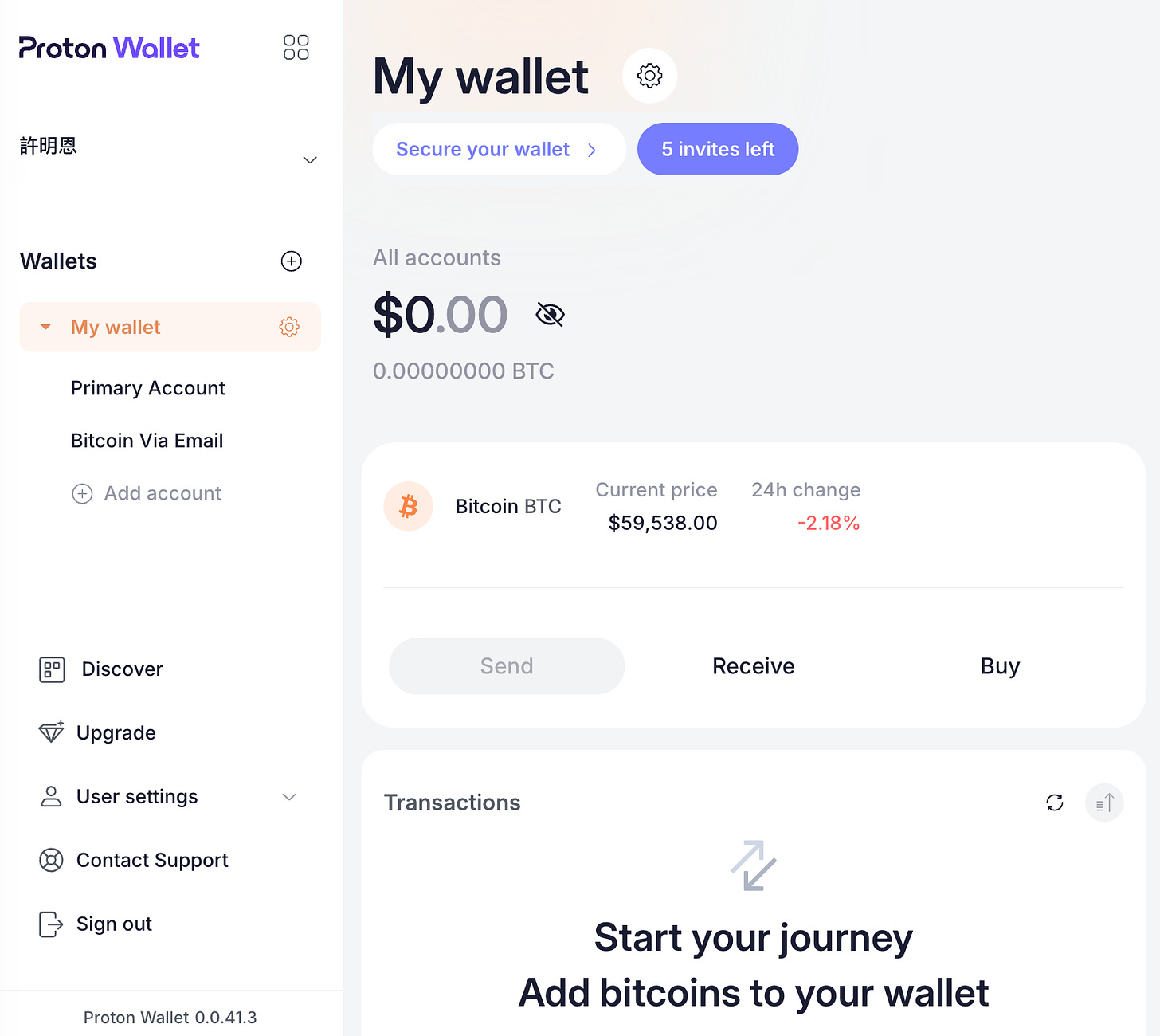Proton Mail Ventures into Bitcoin: Safeguarding Freedom of Speech and Achieving Financial Freedom
#627
GM,
First, a quick announcement. Next Tuesday from 8 PM to 9 PM, I’ve been invited to join the online voice event hosted by the Telegram group "CryptoBar X Cryptocurrency Flow" to share my firsthand experience with public funding.
What makes "Cryptocurrency Flow" unique is its community culture. They have an unspoken rule that you have to do an airdrop before flaunting your wealth. So, while the group has its fair share of trash talk, the vibe is more like casual water cooler conversations. It's one of the few grassroots communities I actively follow and engage with. I invite everyone to join in the fun.
Let's get into the main topic. Some people are interested in cryptocurrency not because they want to make money, but because it offers better privacy1 and autonomy compared to centralized financial systems. I’ve noticed that many Blocktrend readers don’t use Gmail for their email but instead prefer Proton Mail, which is known for its focus on security and privacy. I’m a paid user of Proton myself, using their services for email, VPN, and password management. Feel free to use my referral link.
When I saw Proton announce the launch of their Bitcoin wallet, I was thrilled, and I also learned about the shadow of oppression Proton faced from PayPal during its early days. This dates back to 11 years ago.
Crowdfunding
Proton Mail was founded in 2013 by Andy Yen, a Taiwanese scientist who was working at CERN (the European Organization for Nuclear Research) at the time. His family, like mine, hails from Tainan. CERN is essentially the birthplace of the internet, as Tim Berners-Lee, the inventor of the World Wide Web (WWW), also worked there.

ProtonMail functions just like the well-known Gmail and Outlook, with the key difference being that Proton enhances your privacy and security behind the scenes. Forbes succinctly described ProtonMail as the only email system that even the NSA cannot access. Even hackers love it. Privacy is a lucrative business, but the hardest part is convincing users to pay for it. Otherwise, users ultimately become the "product" sold to advertisers.
ProtonMail doesn’t follow the advertising model. Instead, it chose to launch a crowdfunding campaign to secure its initial funding and maintain its operations through a subscription-based model. According to ProtonMail:
Our goal is simple: to protect people from the mass surveillance of governments and corporations. We believe that privacy is a fundamental human right worth protecting at all costs. The internet makes it easier than ever to be subject to surveillance threats, and the lack of privacy is incredibly dangerous. In many cases, privacy and freedom go hand in hand.
At the time, crowdfunding had not yet become commercialized, and Andy Yen genuinely needed to raise funds to build ProtonMail. He successfully attracted support from thousands of people worldwide, raising $275,000 in just two weeks. However, halfway through the campaign, Yen received a terrifying call from PayPal informing him that ProtonMail's account had been temporarily frozen. From that moment on, they could no longer receive any crowdfunding funds, nor could they withdraw them.

Without any prior notice, PayPal called to freeze ProtonMail’s account right in the middle of their crowdfunding campaign, which was in full swing. When Andy Yen asked PayPal why they froze the account, the response was: "We're not sure if ProtonMail is operating legally, and has your encrypted email service been approved by the government?"
This infuriated Yen. PayPal couldn’t specify which government they were referring to, nor explain why ProtonMail needed government approval to create encrypted email. At the time, PayPal was the preferred payment method for many, and soon after the account was frozen, messages from backers about failed payments began flooding in. Every second counted in crowdfunding, so ProtonMail had no choice but to disable PayPal as a payment option and ask people to pay via credit card or Bitcoin instead.
Fortunately, the next day, PayPal restored ProtonMail’s account and apologized for the "technical issue." However, this terrifying experience left a lasting mark on Andy Yen's memory. As a result, Proton has continued to keep a portion of their reserves in Bitcoin, which ultimately influenced their recent decision to launch a Bitcoin wallet.
Financial Freedom
According to Proton Wallet's product announcement:
Our long-term goal is to create a wallet that allows users to have complete control over their digital assets. While Proton Wallet currently only supports Bitcoin, we plan to add more asset types over time... In the future, we may include fiat currency functionality, but this requires obtaining a Swiss banking license, so it's not something we can roll out just yet. We want Proton Wallet to be more than just another wallet; we hope it becomes the go-to choice for beginners getting into Bitcoin.
Proton Wallet is still in closed beta. However, while writing this article, I received an invitation to test it, so I can share some screenshots with you. If you’re expecting Proton Wallet to have a lot of cutting-edge features, you might be disappointed.

The wallet's performance is fairly average. After all, Proton Wallet is just getting started, currently supporting only BTC, with limited functionality. However, what I want to focus on is the deeper meaning behind Proton creating this wallet—the pursuit of freedom:
Proton is not a cryptocurrency company. We don’t do trading, we aren’t an exchange, and we don’t engage in lending. But we believe that controlling personal wealth is the key to achieving freedom. Over the past 50 years, society has shifted from cash payments to digital payments controlled by banks and tech companies. This has eroded our privacy. People’s power has gradually been handed over to centralized institutions whose interests do not align with ours. By creating Proton Wallet, we aim to provide everyone with a free, secure, and easy-to-use wallet that allows you to fully control your digital assets.
Recently, I came across a famous quote by Charlie Munger: "Show me the incentive, and I'll show you the outcome."
Applying it here: the lack of privacy is the outcome, but what’s the incentive? I believe it stems from the internet’s initial design lacking a built-in payment system. The HTTP status code "402 Payment Required2" is proof that the original designers had considered integrating payment functionality into the internet. Unfortunately, at that time, Satoshi Nakamoto hadn’t written the Bitcoin whitepaper yet, and Vitalik Buterin hadn’t even been born.
With no built-in payment system, the internet had to find other ways, eventually leading to the current state of the web. Companies have to rely on attention and surveillance capitalism3 to make money in order to build "free" products like Gmail and Facebook. From this perspective, Andy Yen creating a cryptocurrency wallet is in line with what Proton has been doing since day one—protecting privacy.
If people had access to a global payment network as simple as sending a message, it could unlock entirely new business models based on user payments. This would ensure that advertising isn’t the only way companies can profit, which in turn would protect privacy and promote freedom.
Still Not User-Friendly
However, looking ahead to 2024, we’re still some distance from achieving this vision.
There are many criticisms of cryptocurrency, ranging from environmental concerns and high transaction fees to susceptibility to scams. Ethereum recently addressed its energy waste problem by transitioning from GPU mining to more eco-friendly ETH staking4, significantly reducing power consumption. The issue of high transaction fees also shows a glimmer of hope, with transaction fees on emerging blockchains dropping to below NT$0.1. As small transaction fees become less of an issue, some companies have begun subsidizing these fees5 and experimenting with new business models.
Yet, the wallets that are closest to users still fall short of being praised as user-friendly. Scams and lost cryptocurrencies can, of course, be attributed to users not doing their homework. But blaming users for being inexperienced doesn’t drive progress. The real issue is that wallet mechanisms aren’t intuitive enough. Wallet developers, on the other hand, might argue that it’s not for lack of trying—many mechanisms are still in research and development stages.6
Fundamental research requires significant manpower and long-term commitment, and there are no shortcuts. The crypto space has attracted considerable talent during each bull market,7 but every bear market washes out a large number of people. This back-and-forth progression—three steps forward, two steps back—has brought us to where we are now. Criticizing cryptocurrencies for lacking concrete use cases at this point is like pointing at a construction site and saying that the building isn’t ready to live in or conduct business. Sorry, you’re just too early.
Proton’s development of a cryptocurrency wallet is not only an immediate strength in the crypto space but also a step closer to protecting freedom of speech and achieving financial freedom.
Blocktrend is an independent media platform sustained by reader subscription fees. If you find Blocktrend's articles valuable, we welcome you to share this piece. You can also join discussions on our member-created Discord or collect the Writing NFT to include this article in your Web3 records.
Furthermore, please consider recommending Blocktrend to your friends and family. If you successfully refer a friend who subscribes, you'll receive a complimentary one-month extension of your membership. You can find past issues in the article list. As readers often inquire about referral codes, I have compiled them on a dedicated page for your convenience. Feel free to make use of them.



